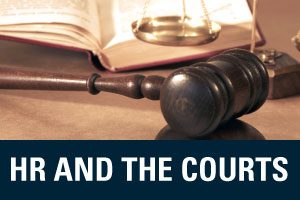by CUPA-HR | March 13, 2024
Each month, CUPA-HR General Counsel Ira Shepard provides an overview of several labor and employment law cases and regulatory actions with implications for the higher ed workplace. Here’s the latest from Ira.
Dartmouth College May Appeal NLRB’s Decision Allowing Basketball Players to Unionize
The Dartmouth College men’s basketball team voted 13-2 to unionize, selecting the Service Employees International Union Local 560 to represent them in collective bargaining. While student-athletes at Northwestern University voted to unionize some 10 years ago, the National Labor Relations Board declined jurisdiction in that case. Here, the NLRB appears to be taking a different approach and has affirmed the regional director’s decision that the basketball players are employees of the college.
Bloomberg reports that Dartmouth stated it has “deep respect” for its unionized workers but does not believe this path is “appropriate” for basketball players. Dartmouth has argued to the NLRB that its student-athletes are not employees and that its basketball players are participating in a voluntary extracurricular activity. The NLRB, with one dissenting vote, denied Dartmouth’s motion to stay its decision, ruling that the basketball players are employees of the institution. The legal path forward is complex, and we will report on developments as they occur.
Separately, the NLRB is conducting a hearing on the West Coast involving an unfair labor practice complaint filed against the University of Southern California, the Pac-12 Conference and the NCAA regarding their refusal to bargain with a union representing football and basketball players at USC. The NLRB general counsel has publicly stated that she believes student-athletes are employees who should be able to unionize.
Student-Athlete Employee Status Could Lead to Student Visa Problems
The classification of college student-athletes as employees could lead to F-1 visa problems for international athletes enrolled in U.S. colleges and universities. The F-1 visa restricts work to 20 hours per week when classes are in session and 40 hours per week when classes are not in session. The F-1 visa is used by roughly 20,000 international athletes enrolled in U.S. colleges and universities.
Possible workarounds are either the P-1 visa, which is a nonimmigrant visa used by professional athletes, or an O-1 visa, which is used by individuals with extraordinary ability. Commentators conclude that these workarounds are not feasible on the scale necessary to accommodate the number of international student-athletes involved. A legislative solution will probably be necessary to address this problem should the employee status of college athletes be confirmed by the NLRB, or in other litigation under statutes such as the Fair Labor Standards Act.
Union Membership and Strike Activity Rose Dramatically in 2023
Bloomberg Law’s statistical analyses show that union membership and strike activity rose considerably in 2023 to levels not seen in years. Unions organized almost 100,000 new workers in NLRB-supervised elections in 2023, the largest single year total since 2000. This is the fourth-largest total one-year organizing gain since 1990, according to Bloomberg Law statistics. This is also the first time since 1990 that unions have managed to increase their annual headcount for three years in a row.
The news is similar on the strike activity front. Over 500,000 workers participated in work stoppages in 2023. This is the second-highest number since Bloomberg Law began collecting this data in 1990. The only year that saw more strike activity since 1990 was 2018, the year of multiple city- and state-wide teacher strikes.
SpaceX’s Challenge to NLRB’s Administrative Procedures Is Transferred From Texas to California
A federal district court judge in Texas recently granted the NLRB’s motion to transfer SpaceX’s constitutional challenge from federal court in Texas to federal court in the Central District of California, where the underlying facts, NLRB hearing, and decision took place (SpaceX v. NLRB (S.D. Tex., No. 24-00001, Motion Granted 2/15/24)).
SpaceX argued that the Texas venue was proper because SpaceX has operations and employees in Texas who received and were subject to a company letter, distributed nationally, that the NLRB ruled violated employee rights under the National Labor Relations Act.
The Texas federal judge rejected SpaceX’s arguments, concluding that the underlying California-based administrative proceedings were brought against a California-based company and involved its California employees. With the transfer of the case to California, SpaceX lost a potentially more favorable appeals court precedent and appellate review. The 5th U.S. Circuit Court of Appeals (covering Louisiana, Mississippi and Texas) is viewed as more conservative than the 9th Circuit, which covers California. In addition, the 5th Circuit has in the past ruled that aspects of decisions by other federal agencies, including the Securities and Exchange Commission, violate the U.S. Constitution.
Employer Risk Associated With Targeting Remote Workers for Termination
Remote work is not in and of itself a protected classification under federal or state civil rights laws. Nonetheless, the reasons for remote work could be protected, such as a disability-related concern. Bloomberg Law commentators conclude that remote workers are more likely to be laid off or miss out on promotional opportunities than peers who work in the office or in hybrid environments. Also according to Bloomberg Law, studies demonstrate that remote workers are more likely to be women, persons of color and those with disability accommodations. Evidence that any of those protected factors contributed to the termination, layoff or failure to promote could give rise to a successful challenge of the employment action under either the Americans with Disabilities Act or applicable state or federal civil rights statutes.
Disney Actor Tests California State Law Protecting Employees From Discharge for Off-Work Political Comments
An actor in the Disney show “The Mandalorian” filed a lawsuit claiming that she was unlawfully terminated from the show because of political comments she made outside of the workplace. Actor Gina Carano claims she was terminated after social media posts comparing the treatment of Trump supporters to how Jews were treated during the Holocaust. The plaintiff also alleges that Disney took issue with other comments she made on the COVID-19 vaccine, gender identity and voter fraud during the 2020 election.
The lawsuit has been filed in federal court in the Central District of California and is being funded by Elon Musk. The suit was filed under a California statute that has broader protections than Title VII in protecting off-work political comments and has no cap on damages. Section 1101 of the California Labor Code protects a worker’s right to political expression outside of work, including speaking up for a candidate or cause.
The plaintiff also alleges sex discrimination and that Disney treated male actors more favorably in similar circumstances. She alleges that male stars Mark Hamill and her co-star Pedro Pascal were treated more favorably when they engaged in off-work political statements. The breadth of the protection and scope of the California statute will be tested by this litigation brought against Disney.
NLRB Reverses Decision, Finds Home Depot Violated NLRA Over Employee’s Black Lives Matter Slogan
A three-member panel of the NLRB ruled 2-1 that Home Depot violated the NLRA when it told an employee that he could not work with a “BLM” slogan on his company-issued apron, thus forcing his resignation (Home Depot USA (NLRB Case no. 18-CA-273796, 2/23/24)). The NLRB panel reversed the decision of the administrative law judge who had handled the trial of the case and had ruled in favor of Home Depot, holding that the company had the right to maintain its rules about company uniforms.
The NLRB panel reversed, concluding that Home Depot violated the NLRA because the record demonstrated the employee’s protest was in furtherance of earlier group complaints about racism in the Home Depot workplace. In these circumstances, the NLRB concluded that the employee’s action in working with a Black Lives Matter slogan on his work apron was protected, concerted activity under the NLRA, as a “logical outgrowth” of earlier employee protests of race discrimination at the specific Home Depot store. The dissenting board member stated in his decision that the majority holding was an “unprecedented extension” of the “logical outgrowth” theory.



